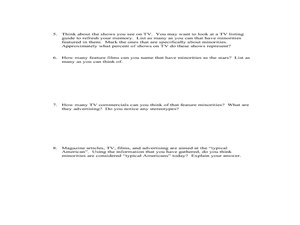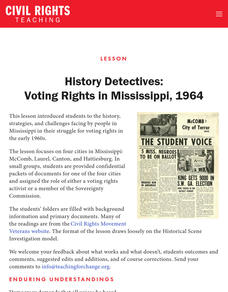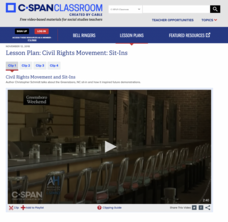iCivics
The Road to Civil Rights
Here is a fantastic resource on the civil rights movement! It includes reading materials and worksheets, and particularly highlights major legislation and the role of the judicial branch in the federal government in addressing the...
Stanford University
Civil Rights Act of 1964
Was JFK a fallen Civil Rights hero—or a fraud? Learners examine Kennedy's own words and those of his critics to decide for themselves. After examining Kennedy's actions before his assassination, they determine what sort of legacy he left...
Curated OER
The Civil Rights Act of 1964 and the Equal Employment Opportunity Commission
Young scholars discuss the Civil Rights Act of 1964 (and affirmative action) and how it has influenced American history in the decades since it's signing.
National Endowment for the Humanities
The Freedom Riders and the Popular Music of the Civil Rights Movement
The Civil Rights Movement of the 1960s marched to its own beat—literally. Using songs from the era, as well as other primary sources such as King's "I Have a Dream" speech, class members analyze lyrics to discover how music and protest...
Teaching for Change
A Documents-Based Lesson on the Voting Rights Act
How did the Voting Rights Act affect the daily lives of American citizens? A document-based lesson developed by the Student Non-Violent Coordinating committee (SNCC) presents a case study of the impact of the Voting Rights Act of 1965 on...
PBS
Martin Luther King Jr.: Civil Rights Leader
Expand class members' appreciation of the work of Dr. Martin Luther King, Jr. A powerful resource examines King's speeches, writings, and actions that reveal his deep commitment to a nonviolent approach to Civil Rights. Learners watch a...
Newseum
Civil Rights: Identifying Community Issues
As part of the social, economic, and legal/political civil rights study, class members brainstorm a list of current civil rights issues that affect their community. Individuals or pairs select one issue to research further. The class...
PBS
Rosa Parks: Civil Rights Activist
Scholars examine the courageous efforts made by civil rights activist, Rosa Parks. Discussion questions and a brief writing assignment follows a short film. A photograph and a silent film delve deeper into Park's history and three...
Curated OER
Laws of Civil Rights
Students investigate the Civil Rights Act of 1964. In this segregation lesson, students explore the rights that were guaranteed by the legislation as well as attempts by southerners to stop African Americans from voting. Students...
Curated OER
Discrimination in the Workplace
Students become familiar with civil rights law, particularly Title VII of Civil
Rights Act of 1964, which addresses instances of discrimination in the workplace. Students then recognize instances of workplace discrimination against...
Curated OER
Minorities in Mainstream American Society
So many people fought for Civil Rights in the United States. Read about the Civil Rights Act of 1964, and discuss what the act guarantees. Then pass out a slew of magazines and encourage them to observe how often minorities appear in...
Teaching for Change
History Detectives: Voting Rights in Mississippi, 1964
Promises made and promise broken. Spies and activists. Voting rights in Mississippi are the focus of a lesson that has class members research the history of the struggle in Mississippi. Learners take on the role of voting rights...
UnboundEd Learning
Rosa Parks: The Mother of the Civil Rights Movement
Class members listen to a passage on Rosa Parks, examine images of the Montgomery Bus Boycott, and respond to questions based on the text. They then craft a free-verse poem that recounts her achievements and reveals why she is considered...
C-SPAN
Civil Rights Movement: Sit-Ins
Part of the protests of the Civil Rights Movement were small scale sit-ins at lunch counters. This form of on-the-ground activism is the focus of a C-SPAN resource that includes four video-clips about the sit-ins by pupils at a lunch...
US House of Representatives
Hispanic-American Members of Congress in the Civil Rights Era, 1945–1977
Debates around immigration in the news are not new, but they are a defining feature of the Hispanic American experience throughout the twentieth century. Looking through the lens of Hispanic Americans in Congress, class members explore...
Newseum
Civil Rights: The Five Freedoms
After a close reading of the First Amendment and the five freedoms it guarantees, class members examine the civil rights timeline to see how civil rights groups applied these freedoms to create change. Using the issue the class chose in...
K20 LEARN
Forgotten Figures: The Civil Rights Movement
Most have heard of Dr. Martin Luther King, Malcolm X, and Rosa Parks, but few recall Elizabeth Jennings, Samuel W. Tucker, or Ada Lois Sipuel Fisher. Young historians research and then develop a presentation about the contributions of...
Curated OER
That's So Raven: True Colors
Students study the contributions of African Americans and place these figures on a timeline. They examine the Civil Rights Acts and how it came to be using a Disney Cable in the Classroom lesson.
Albert Shanker Institute
Heart of the Matter
Most people have heard of Dr. Martin Luther King, Jr. and his famous "I Have a Dream" speech, but few have heard of Philip Randolph and Bayard Rustin. Who were these guys and what did they have to do with this famous landmark event in...
National Park Service
The Selma to Montgomery Voting Rights March: Shaking the Conscience of the Nation
Travel back in time to examine how tragic events can spur positive change. Scholars explore the impact of the Selma Voting Rights March, including the tragic loss of life and the later signing of the Voting Rights Act of 1965. Academics...
Atlanta History Center
Civil Disobedience and the Atlanta Student Movement
What tactics are used in civil disobedience? Learners study the conditions in Alabama that led to the establishment of the Atlanta Student Movement, as well as consider the nature and effectiveness of civil disobedience.
Curated OER
Civil Rights: An Investigation
High schoolers take a closer look at the political side of the American Civil Rights Movement. For this 20th century American history lesson, students research the contributions of President Johnson, Dr. Martin Luther King, Jr., and J....
C-SPAN
Last Days of Martin Luther King, Jr.
On April 4, 1968, Dr. Martin Luther King, Jr. was assassinated in Memphis, Tennessee. Four video clips reveal the events of that time, including the shift in the focus of the Civil Rights Movement, the aftermath of the assassination, and...
Alabama Department of Archives and History
The Wrong Side of History: How One Group Justified Its Opposition on the Freedom Riders and Civil Rights for African Americans
Designed as a supplement to the study of the Freedom Riders, this resource uses primary sources to reveal the views of those who opposed the Freedom Riders. After careful study of the arguments presented by the members of the Montgomery...

























